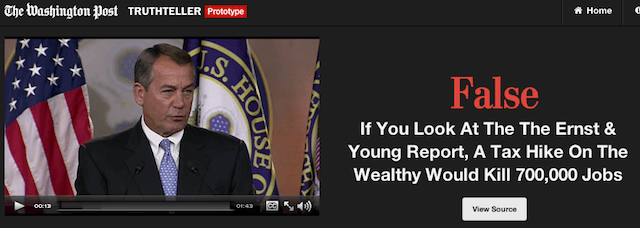We are coming closer to a reality where no politician can ever spread well-known lies. Today, exclusively with TechCrunch, The Washington Post has announced a fully automated fact-checking program, Truth Teller, that displays “TRUE” or “FALSE” in real time next to video of politicians and pundits as they speak. Given the fact that almost one-fifth of registered voters still believe Obama is a Muslim, a tool to curb widespread myths could benefit our democracy. Check out a demo below:
The Knight Foundation-funded Truth Teller program automatically transcribes speeches and checks the statements against a database of well-known facts. For example, when House Speaker John Boehner claims that raising taxes on the top 2% would kill 700,000 jobs, Truth Teller pops a big red “FALSE” next to him, after cross-checking his statements against The Washington Post‘s own list of curated facts and other popular fact-checker databases.
For now, the early beta prototype has to be manually hand-fed some facts, and thus only works on topics it has been specifically designed to recognize. Since Congress has yet to pass a budget, and financial discussions are prone to widespread lies and misstatements, Truth Teller is being piloted on the issue of tax policy.
Eventually, The Washington Post‘s digital team hopes that Truth Teller can automatically draw from wisdom of the entire Internet and be available for citizens on their smartphones to fact-check politicians as they hold backyard BBQs during campaign season. Indeed, National Political Editor, Steven Ginsberg tells TechCrunch that he was inspired to pursue the project after witnessing Republican candidate Michele Bachmann spread lies to a small crowd of unsuspecting Iowans.
“You can imagine how that would change not just that scene but basically all of political discourse,” says Ginsberg, imagining if Iowans attending her talk were equipped with a smartphone version of Truth Teller. “If she’s lying to you and you say ‘Wait a second, you just lied to me,’ then you’ve got a whole different event than if she’s just talking.”
There’s definitely precedent for the way real time fact-checking can completely alter the outcome of discourse. During the 2012 President debates, CNN moderator, Candy Crowley, corrected Mitt Romney after he claimed that the President had not characterized an attack on the Libyan embassy in Benghazi as an “act of terror”. Immediately, Mitt Romney lost his momentum in the debate and it became a widely cited example in how Obama had verbally thumped Romney, turning the tide of public opinion after a disasterous first debate.
That said, the very same example highlights some hurdles that Truth Teller will need to overcome.
First, Crowley had to clarify her decision the next morning, after conservatives criticized her for misunderstanding that Romney accused Obama of not characterizing the attack as pre-medicated terrorist act, even if Obama did technically use the word “terror” in describing the event. In a highly nuanced and politically charged environment, even statements of fact are up to interpretation. If Truth Teller can only legitimately tackle unadulterated lies, the scope of its impact may be less than the Washington Post hopes for.
Second, political psychologists have long known a quirky fact about human belief: more information can often cause people to cling more stubbornly to blatant lies. Just last week, Mother Jones reported on another study that found that politically knowledgeable Republicans were especially prone to conspiracy theories. Journalists love to believe that the truth sets a democracy free–but human psychology humbles that philosophy.
The reality is, The Washington Post‘s* project takes us one step closer to a place where democracy has never been. It could very well have profound effects on the most malicious rumors that feed an ever-increasingly partisan political discourse. The upside to a major news network such as Fox or CNN implementing a polished version of Truth Teller is probably well worth the risk.
It’s one giant social experiment, with the hypothesis being that lies are one foundation of partisanship and ill-informed voting. Psychology and technical hurdles aside, I’m an optimist. I think this is the future of news, and, on the whole, the majority of reasonable (though ill-informed) Americans will enjoy being alerted to lies.
Democracy will be better off with more of the truth.
*I have been a non-paid contributed to The Washington Post in the past and may be again in the future. None of the members on this product work with me on editorial issues.
